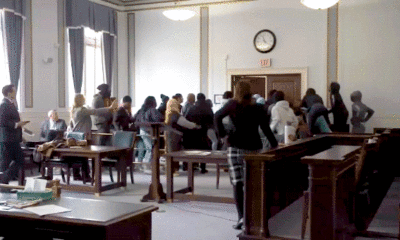Georgia
OSCE parliament urges Russia to withdraw from occupied Georgia territories

The Organization for Security and Co-operation in Europe’s (OSCE) parliamentary assembly on Wednesday called for Russia’s immediate and unconditional withdrawal from the occupied Georgian territories of Abkhazia and Tskhinvali/South Ossetia in its 31st annual session that took place in Bucharest from June 29 to July 3, 2024.
The OSCE parliamentary assembly’s demand for Russia to adhere to the European Union-mediated ceasefire agreement of August 12, 2008 was stated in the Bucharest declaration adopted by it. These demands echo those made in the previous year’s Vancouver Declaration.
The hostilities in South Ossetia in August 2008 marked the beginning of the current occupation. On August 7, 2008, clashes broke out between Georgian forces and separatist authorities backed by Russian security agencies. By August 10, the situation had deteriorated significantly, prompting international calls for a ceasefire. On August 12, a European Union-mediated ceasefire agreement was signed, calling for the withdrawal of Russian and Georgian forces. Despite this agreement, Russian forces have remained in the occupied regions. The European Court of Human Rights recently ruled that Russia’s occupation in Georgia systematically violated Georgians’ human rights in April.
Nikoloz Samkharadze, chairperson of the Foreign Relations Committee of the Georgian Parliament, brought this issue to the forefront during the session. Addressing the General Committee on Political Affairs and Security, Samkharadze emphasized that 20 percent of Georgia’s territory remains under Russian occupation, with 300,000 citizens internally displaced as a result. Samkharadze underscored the pressing need for the international community to take more decisive action. “Negotiations through the Geneva International Discussions have been ongoing for years, including with the OSCE’s Co-Chairing, however the [normalisation] of the peace process still is not being achieved,” he said.
The OSCE Parliamentary Assembly’s resolution condemns the human rights abuses in Abkhazia and Tskhinvali as well as highlights the Russian Federation’s “Russification” policy, which has led to the alteration and obliteration of Georgian cultural heritage in these regions. The Assembly stressed the necessity of continuing active engagement within the Geneva International Discussions framework to achieve a peaceful resolution that respects Georgia’s sovereignty and territorial integrity.

Georgia
Middle Georgia DSA condemns U.S.-Israel strikes on Iran, calls escalation ‘illegal’

MACON, Ga. (WGXA) — Middle Georgia Democratic Socialists of America (DSA) has issued a statement regarding the U.S. and Israel’s joint strikes on Iran over the weekend.
According to other WGXA articles, based on reports as of early March 2026, the United States and Israel have launched major, coordinated military operations against Iran, labeled in reports as “Operation Epic Fury” and “Operation Midnight Hammer”. This follows months of failed nuclear negotiations and escalating regional tensions.
RELATED | Hegseth insists US-Israel strikes on Iran are ‘not Iraq, not endless’
WGXA asked Middle Georgia DSA, the largest activist organization in Middle Georgia, for their opinions on the strikes, and they responded with this:
The strikes on Iran, carried out by the United States and Israel, mark a catastrophic escalation in an illegal act of aggression. The Iranian people do not deserve to live in fear of American bombs and of the instability of regime change. Americans do not want our tax dollars and the lives of our people to be wasted on opening up a new war in the Middle East, or on bombing girls’ elementary schools. We want relief from the affordability crisis. We want peace. Middle Georgia DSA unequivocally condemns these attacks and any politicians who cannot do the same. We do not want this, we do not deserve this.
DSA added that they are not currently planning any protests at this time, and that they “remain focused on improving the conditions of people who live within our communities directly, and do not feel a protest is the best strategy to deliver on that.”
Middle Georgia DSA condemns U.S.-Israel strikes on Iran, calls escalation ‘illegal’, March 2, 2026 (Image is meant to say 2026 instead of 2025, Courtesy of GCSU Mutual Aid)
However, GCSU Mutual Aid, a grassroots, community-led initiative focused on collective care and resource sharing within the Milledgeville and broader Middle Georgia area. While not an official department of Georgia College & State University (GCSU), it frequently operates in coordination with student-led groups and local residents to address gaps in traditional social safety nets.
RELATED | GCSU encourages peaceful expression ahead of national ICE walkout
GCSU Mutual Aid is planning a protest for Wednesday, where they will be “Marching for Democracy” in retaliation to recent events in the U.S.
BE THE FIRST TO COMMENT
Stick with WGXA as we keep you ready for what’s next.
Georgia
Florida Continues Push to Beat Out Georgia for Top LB Recruit

After a huge ratings boost in the updated Rivals300 rankings that now has Joakim Gouda as a top-30 prospect in the 2027 class, the Florida Gators remain in contention for the elite Georgia linebacker despite an apparent leader in his recruitment.
Gouda, once unranked by Rivals, is now the second-highest-rated linebacker in his class. He has seen multiple expert predictions to land with Kirby Smart and the in-state Georgia Bulldogs recently. However, the Gators have consistently been in the mix for the athletic backer under Jon Sumrall, with both schools making his top five, as well as Texas, Auburn and Alabama, and official visits scheduled to all remaining contenders.
Despite the smoke around Georgia, Florida will still have a strong shot at the 6-foot-2, 225-pound defender with plenty of time left before his decision is officially made.
“Florida is definitely still strongly in the race,” Gouda told Florida Gators on SI. “I’m just focused on building relationships and taking my time. I’m not rushing a commitment — I want to make the best decision for me and my future.”
Though the Gators offered Gouda only just over two months ago, Florida has wasted no time in aggressively pursuing the talented athlete, who is expected back on campus for a visit this spring on top of his scheduled official visit from June 4 to June 6. While still somewhat early in the building of a relationship, the new staff member has stood out.
“Florida sits in my top 5 because I really like the program and the energy around it right now. Even with a lot of competition, I believe in my ability to compete and contribute.” Gouda said. “I think I could fit in well with Sumrall and the new staff because I’m coachable, hardworking, and focused on team success. I like their energy and vision for the program, and that’s earned them a real chance in my recruitment.”
Florida’s chances will rely heavily on the next few months, however, as Gouda goes through his visits looking for the best program fit amongst multiple premier options. With a long way to go till signing day, the Gators will have plenty of time to prove to the elite prospect that they meet his criteria.
“From Florida, I’m looking for a staff that truly believes in me, a system where I can develop, and a culture that feels like family,” Gouda said. “A program will earn my commitment by showing consistency, developing players, and giving me the best opportunity to grow on and off the field.”
After making 100 tackles during junior season at South Pauling High School (Ga.), Gouda is expected to surge up recruiting rankings as he heads toward a decision next year. While becoming one of the largest risers in his class as of late, the four-star is not getting complacent.
“The attention on Rivals feels good because it shows people are noticing my work,” Gouda said. “…I think it’s just a result of staying consistent and improving every day, but I’m still keeping my head down and grinding.”
The Gators will likely be in it till the end for the potential future five-star Gouda, with Sumrall and staff looking to fight off Smart in his home state and land one of the more exciting prospects at his position in 2027.
More From Florida Gators on SI
Georgia
South Georgia honors Officer Caleb Abney

VALDOSTA Ga. (WALB) – Family, friends, and law enforcement agencies from across South Georgia gathered at Martin Stadium to remember Officer Caleb Abney.
First responders from across the region stood alongside Abney’s family as Lowndes County opened the stadium for the service.
Lowndes County Board member Chris Buescher said community attendance was important.
“Obviously, these first responders give their all to our community. It is important to come out and support them. We are all heartbroken as a community as one Lowndes family,” Buescher said.
Abney’s ties to the community
Buescher noted Abney’s deep roots in Lowndes County, describing his connection to the area beyond his role in law enforcement.
“Caleb was not only a first responder in terms of the fire department, a police officer. He was a former Lowndes County High graduate. He was a former Georgia Bridgeman. So he marched on this very field that these last respects were paid to. So his mom and dad were big volunteers within the school system. So it is important to recognize the sacrifices these first responders make for all of us in the community,” Buescher said.
Procession travels through Lowndes County
The procession exited Lowndes High School and traveled through several roadways across the area. Family members, guests, and first responders made their way to Fellowship Baptist Church.
Have a news tip or see an error that needs correction? Let us know. Please include the article’s headline in your message.
To stay up to date on all the latest news as it develops, follow WALB on Facebook and X (Twitter). For more South Georgia news, download the WALB News app from the Apple Store or Google Play.
Copyright 2026 WALB. All rights reserved.
-

 World5 days ago
World5 days agoExclusive: DeepSeek withholds latest AI model from US chipmakers including Nvidia, sources say
-

 Massachusetts6 days ago
Massachusetts6 days agoMother and daughter injured in Taunton house explosion
-

 Denver, CO6 days ago
Denver, CO6 days ago10 acres charred, 5 injured in Thornton grass fire, evacuation orders lifted
-

 Louisiana1 week ago
Louisiana1 week agoWildfire near Gum Swamp Road in Livingston Parish now under control; more than 200 acres burned
-

 Technology1 week ago
Technology1 week agoStellantis is in a crisis of its own making
-

 Oregon4 days ago
Oregon4 days ago2026 OSAA Oregon Wrestling State Championship Results And Brackets – FloWrestling
-

 Technology1 week ago
Technology1 week agoArturia’s FX Collection 6 adds two new effects and a $99 intro version
-

 News1 week ago
News1 week agoVideo: How Lunar New Year Traditions Take Root Across America


















